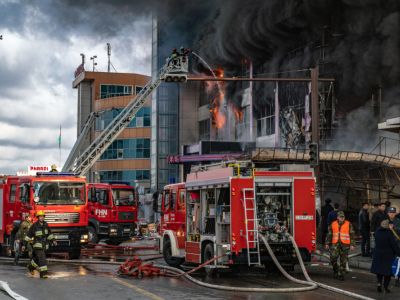FBI agents across the United States were Friday deepening their probe into the men who hijacked the planes in September 11's terrorist attacks after worrying doubts emerged over their true identities.
As US allies rallied to help trace the attackers as well as their sources of finance, FBI Director Robert Mueller conceded Thursday that the names of some of the 19 men earlier identified by Washington as the hijackers had been called into question.
FBI investigators in Chicago were questioning 34-year-old Nabil Marabh, who was picked up Wednesday on suspicion of having aided the men who commandeered four jetliners and flew three of them into New York's World Trade Center and Washington's Pentagon on September 11.
President George W. Bush late Thursday singled out a militant Islamic group led by Osama bin Laden, a Saudi-born exile believed to be hiding in Afghanistan, as the chief culprit.
"The evidence we have gathered all points to a collection of loosely affiliated terrorist organizations known as al-Qaeda," Bush told a joint session of Congress. "They are the same murderers indicted for bombing American embassies in Tanzania and Kenya, and responsible for the bombing of the USS Cole."
But, despite the detention of four other people considered material suspects -- individuals believed to have information vital to the probe -- US officials have produced no public evidence linking the hijackers to bin Laden.
Part of the problem facing investigators is the emerging belief that at least some of the 19 hijackers used stolen identification.
In Washington, the Saudi embassy said Thursday that two Saudi citizens identified by the FBI as hijackers were alive and had their passports stolen years ago.
Saudi Foreign Minister Prince Saud Al-Faisal, who was visiting Washington, said at least five Saudis on the FBI list "had no connection at all with what happened."
The New York Times said Marabh was believed to be a "close associate" of bin Laden, and could provide the first formal link between the illusive millionaire and the attack.
But the head of the FBI's Chicago office, Kathleen McChesney, said they were still trying to establish his identity, adding: "We still have a lot of work to do."
Agents searching for Marabh had 48 hours earlier arrested at his home in Detroit three men of Arab descent and found false documents, maps of the city's international airport and documents on a US base in Turkey.
They were Ahmed Hannan, 33, Karim Kubriti, 23, and Faruk Ali-Halmud, 21, the FBI said.
According to the spokeswoman, investigators found a notebook with notes in Arabic about "a US base in Turkey," about the "US Secretary of State," about Jordan's Alia airport, its runways and air corridors above it.
But just as the worldwide probe into atrocities which left more than 6,800 people feared dead appeared to get a fillip, FBI Director Mueller admitted that there were doubts over the true identities of the hijackers.
"We have several hijackers whose identities were those on the manifests, we have several others [who] are still in question," Mueller said in Shanksville, Pennsylvania, the site of the crash of one of four passenger jets hijacked in the terror blitz.
Mueller had said last week that his bureau had "a fairly high level of confidence" its list of 19 names reflected those of the attackers.
Doubts over the identities of at least some of the men first emerged from news reports.
One Arabic newspaper said Abdulaziz Alomari, identified as one of the suicide hijackers on the first plane to slam into the World Trade Center on September 11, is alive and in Saudi Arabia and that his passport was stolen several years ago.
Saudi officials have reportedly warned that the terrorists may have been using stolen identity documents when they boarded the doomed aircraft.
The reports prompted US officials to begin investigating whether some or all of the 19 suspects had used stolen identities, possibly seriously complicating efforts to link them to Osama bin Laden.
"The use of false identities is standard in terrorism, but it certainly makes it much harder to trace the act back to its leader and to establish links between terrorist cells," said expert Professor Anthony Cordesman of the Center for Strategic and International Studies in Washington.
Investigators are sifting through more than 96,000 leads and searched for nearly 200 people wanted for questioning about the attack, as tentacles of the probe spread across the globe and Washington's war on terror gathered pace.
In Yemen, dozens of suspected followers of bin Laden were arrested while Lebanese police opened an investigation into Ziad Samir Jarrah, a suspect in the terror attacks, at Interpol's request -- WASHINGTON (AFP)
© 2001 Al Bawaba (www.albawaba.com)









